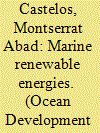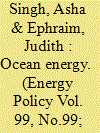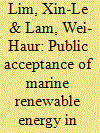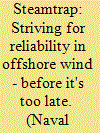|
|
|
Sort Order |
|
|
|
Items / Page
|
|
|
|
|
|
|
| Srl | Item |
| 1 |
ID:
150050


|
|
|
|
|
| Summary/Abstract |
The question whether coexistence of marine renewable energy (MRE) projects and marine protected areas (MPAs) is a common spatial policy in Europe and how a number of factors can affect it, has been addressed by empirical research undertaken in eleven European marine areas. Policy drivers and objectives that are assumed to affect coexistence, such as the fulfillment of conservation objectives and the prioritization of other competing marine uses, were scored by experts and predictions were crosschecked with state practice. While in most areas MRE-MPA coexistence is not prohibited by law, practice indicates resistance towards it. Furthermore expert judgment demonstrated that a number of additional factors, such as the lack of suitable space for MRE projects and the uncertainty about the extent of damage by MRE to the MPA, might influence the intentions of the two major parties involved (i.e. the MRE developer and the MPA authority) to pursue or avoid coexistence. Based on these findings, the interactions of these two players are further interpreted, their policy implications are discussed, while the need towards efficient, fair and acceptable MRE-MPA coexistence is highlighted.
|
|
|
|
|
|
|
|
|
|
|
|
|
|
|
|
| 2 |
ID:
150036


|
|
|
|
|
| Summary/Abstract |
Commercial fishermen are arguably the stakeholder group most likely to be directly impacted by the expansion of the marine renewable energy (MRE) sector. The potential opposition of fishermen may hinder the development of MRE projects and the provision of benefit schemes could to enhance acceptance. Benefit schemes refer to additional voluntary measures that are provided by a developer to local stakeholders. The aim of this study is to explore the issue of the provision of benefit packages to local fishing communities and financial compensation measures for fishermen who may be impacted by MRE projects. Semi-structured interviews were conducted with fourteen fishermen from three separate case study sites around the island of Ireland where MRE projects were being developed. In addition, ten company fisheries liaison officers (CFLOs) who have worked on MRE projects in the UK and Ireland were also interviewed. The interviews were analysed under the headings of local employment, benefits in kind, compensation and community funds and ownership of projects. Analysis shows that there is uncertainty among fishermen over whether they would benefit or gain employment from MRE. Provision of re-training schemes and preferential hiring practices could be used by MRE developers to reduce this uncertainty. There was also agreement between fishermen and CFLOs on the need for the provision of an evidence-base and a standard approach for the calculation of disruption payments. A formal structure for the provision of benefit schemes for fishermen would be useful. Furthermore, schemes that provide a range of benefits to fishermen and other stakeholders over the lifetime of a MRE project are more likely to be successful at enhancing acceptance.
|
|
|
|
|
|
|
|
|
|
|
|
|
|
|
|
| 3 |
ID:
128419


|
|
|
|
|
| Publication |
2014.
|
| Summary/Abstract |
To date, academic research relating to Marine Renewable Energy (MRE) has largely focused on resource assessment, technical viability and environmental impact. Experiences from onshore renewable energy tell us that social acceptability is equally critical to project success. However, the specific nature of the marine environment, patterns of resource distribution and governance means experiences from onshore may not be directly applicable to MRE and the marine environment. This paper sets out an agenda for social studies research linked to MRE, identifying key topics for future research: (i) economic impacts; (ii) wealth distribution and community benefits; (iii) communication and knowledge flow; (iv) consultation processes; (v) dealing with uncertainty; (vi) public attitudes; and (vii) planning processes. This agenda is based on the findings of the first workshop of ISSMER, an international research network of social scientists with interests in marine renewable energy. Importantly, this research agenda has been informed by the experiences of developers, regulators and community groups in Orkney. The Orkney archipelago, off the north coast of Scotland, is home to the most intense cluster of MRE research, development and deployment activity in the world today.
|
|
|
|
|
|
|
|
|
|
|
|
|
|
|
|
| 4 |
ID:
124706


|
|
|
|
|
| Publication |
2013.
|
| Summary/Abstract |
Deployment of marine renewable energy (MRE) in the UK is desirable in order to address climate change, meet mandatory EU renewable energy targets and provide significant economic development opportunities, including new export markets. Public funding constraints in the UK mean that substantial investment is required from the private sector to commercialize the industry. By focussing on investor attitudes and behaviours towards wave and tidal technologies, this paper reveals significant observations from the investment community with serious implications for the future of the MRE industry. Through a series of in-depth interviews with individuals from the investment community, device developers and industry support, the research seeks to identify common barriers and incentives to investment. The paper demonstrates that although investors' attitudes are generally aligned, they do appear to have changed over time. Of the participants that had previously invested in early stage MRE device development, none were likely to do so again. It is concluded that this is a function of investors' greater understanding of the scale, and unpredictability of the costs, and the length of time required to develop these technologies. This presents a significant policy challenge for all actors interested in the commercialization of wave and tidal technologies
|
|
|
|
|
|
|
|
|
|
|
|
|
|
|
|
| 5 |
ID:
131372


|
|
|
|
|
| Publication |
2014.
|
| Summary/Abstract |
Marine renewable energies are still at a very incipient stage. Even so, it can be anticipated that if such energies were to be developed, multiple benefits could be achieved in the environmental, social, and economic spheres. However, these benefits are not without possible controversial aspects. This article examines the content and scope of the applicable international law of the sea regarding the use of renewable energy from the seas.
|
|
|
|
|
|
|
|
|
|
|
|
|
|
|
|
| 6 |
ID:
149949


|
|
|
| 7 |
ID:
127162


|
|
|
|
|
| Publication |
2014.
|
| Summary/Abstract |
Research and development (R&D) on marine renewable energy (MRE) in Malaysia is still in its initial stage. It is crucial to know the level of acceptance of MRE among Malaysians in order to push the technology forward. A survey was conducted to investigate public acceptance of MRE in SS2, Petaling Jaya. In addition, a face-to-face interview was conducted to understand the concerns of an investor about investing in renewable energy (RE) projects. The results of analysis showed that 82.8% of the respondents support MRE implementation in Malaysia. However, 56.8% of the respondents are reluctant to pay for green electricity. The reason is directly linked to the NIMBYist (NIMBY= Not in My Backyard) attitudes of Malaysian citizens. They are unwilling to support green energy by involving themselves, participating or paying money. Furthermore, the interviewee, on behalf of investors, expressed some opinions on concerns about investment in RE projects. Several ministries and departments are suggested as being important in MRE development.
|
|
|
|
|
|
|
|
|
|
|
|
|
|
|
|
| 8 |
ID:
127363


|
|
|
|
|
|
|
|